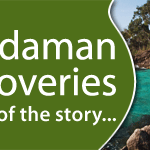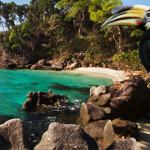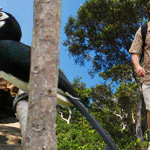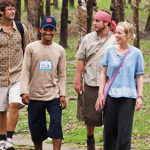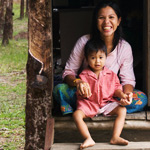Andaman Discoveries Blog
Tuesday, May 8, 2012
Life with the Moken in Tung Dap
This month I had the chance toexperience one of the village tours in the remote village of Tung Dap, locatedon the Island of Koh Prathong, with one of our guests Mandy and our translatorand guide Pi-Tui.
We left Kuraburi and made our wayto the pier and took the long-tail boat out to the Island. The boat ride outthe Island was amazing, the color of the leaves from the mangrove trees wasbright green, glistening and shining in the early morning sun and the oceanturns from green to blue as the boat navigates through the shallow and deepwaters.
Before reaching the island, wewent to explore the mangrove forest and learnt about the way the local peoplemanage the environmental conservation of this mangrove area. We also learnt about the medicinal use of themangroves, and learnt about many animals and crustations which live within themangroves. This is a natural habitat forthese animals which has to be preserved to protect all the remarkable speciesliving there. The amazing mangroveeco-system acts as a nursery for crabs, fish and shrimp, and is well managed bythe villagers, who try to minimize environmental impacts for our futuregenerations.
After that, we met Pi-Noi and herhusband Da Nong and had a delicious lunch together,freshly caught sea food……….. aroy J After lunchwe observed the traditional method to take tin out of the sand, this is a longprocess and very hard work.
We also had the chance to learn how to make squidtraps; it’s not as easy as it looks and it’s amazing how fast the locals weavethe net.
The atmosphere of the village wasvery relaxing and everyone was very friendly. We were able to ask a lot ofinteresting questions about their culture and way of life on the island andwere able to share stories and experiences between our hosts and Mandy thanks to our great translator and guide Pi-Tui.
The cultural exchange was intenseas Mandy was able to tell about her life back in Australia and what herimpressions were of seeing this new culture and Pi-Noi seemed amazed to hearabout Mandy’s life back in her home town and compare the way they live.
At one point, the exchange was quietfascinating, because Pi-Noi was talking about her experience during the 2004tsunami and how challenging it is to be Moken in a rapidly changing world. Moken are very proud of their life style andtreasure keeping the close and important connection with the nature, I was solucky to be part of this exchange.
Later in the day we had a uniqueride through the savannah on a customized tractor a one off ingenuousinvention and had some coconuts caught by Da Nong as he climbed thecoconut tree right in front of the beautiful pristine beach.
After that we came back to thevillage and learnt how to make Thai desert with Pi-Noi. We cooked sticky ricein freshly grated coconut milk and wrapped in a banana leaf, the Thai way.
We’ve been amazed all day by theway villagers welcomed us to their village and with this beautiful landscapesurrounding us.
If you like the sound of thistrip, or if you would like to find out more about this program, don’t hesitateto contact us, it’s a great and unique cultural experience.
Labels: activities, biodiversity, community tourism, community-based tourism, conservation, cultural tours, ecotourism, Moken
Thursday, December 29, 2011
Learning from the Moken
“Where are you from?, we asked the guides from the village. “From the Moken” they said.
Patiently we asked again: “Alright you are Moken, but… where are you from?” Their answer remained the same: “From the Moken”.
After a bumpy hour and a half ride on a speedboat and another short ride on a long-tail we have had finally arrived at the Moken Village on Surin Island off the North Andaman coast of Thailand.
AD founder Bodhi Garret was leading the pilot tour organized for our guests (writer Oliver and photographer Catherine) from the BBC’s Lonely Planet Magazine.
Bodhi has known the Moken people for some
 time now and the respect he has for them is mutual and evident from the way they greeted each other with friendly smiles and warm hugs. After all not many ‘farang’ speak Thai with ease like Bodhi does and are able to communicate directly with the indigenous peoples from this region. We all felt very privileged to be part of the pilot tour, which was meant to establish AD’s ‘Life of the Moken’ program as a responsible and ethical alternative to the tours, which others operate on the island.
time now and the respect he has for them is mutual and evident from the way they greeted each other with friendly smiles and warm hugs. After all not many ‘farang’ speak Thai with ease like Bodhi does and are able to communicate directly with the indigenous peoples from this region. We all felt very privileged to be part of the pilot tour, which was meant to establish AD’s ‘Life of the Moken’ program as a responsible and ethical alternative to the tours, which others operate on the island.The Moken have provoked interest ever since the tsunami struck this region and
 these nomadic sea gipsy people had to make a more permanent settlement on the island.
these nomadic sea gipsy people had to make a more permanent settlement on the island.It is no wonder that for us the question ‘where you from?’ seemed like a logical one, but the answer we received showed just how our perception of ones origin was only limited to indicate a place. For the Moken guides who were showing us around their village and gave us a glimpse of their world, this same question carries the meaning of the people you grew up with, the values that you learned, rather than a physical location.
Traditionally, the Moken sea nomads traveled to coastal and island areas in the Mergui Archipelago by their “kabang” (boat), which served both as a home and means of transportation. They would spend seven months fishing during the dry season and take refuge on land during the monsoon. As an ethnic minority in Thailand they are struggling to keep their legacy alive.
The Moken guides led us through their village, shared stories of their lives and gave insights into their struggles and dreams. On the “Chok Madah” Nature-Culture Trail through the jungle behind the village, they showed us various types of plants and trees that they use in daily life; edible herbs, healing plants and woods used for the construction of their huts and boats. In Moken language, Chok means a small bay, and Madah is the name of a local man who anchored his boat in the bay to gather shellfish and forest products. The Moken who now live a semi-nomadic life have used this foraging trail for generations. Twenty stations with interpretive signs are placed along the trail, providing information on specific topics and insights into the world of the Moken.

On a our second day accompanied by our Moken guides we set off on a long tail boat for a snorkeling dive, at a site known as Nemo bay, frequented by the beautiful clown fish of that name. To observe our Moken guides while snorkeling is an experience in itself, for you would never see someone show such grace and peacefulness while diving down to point at the hiding moray eel. Back on the boat Pi Tao, an elder Moken with a peaceful smile, had just finished brewing delicious coffee for all to enjoy.
A couple of days in the company of these kind hearted and warm people inevitably makes you appreciate their culture and wonder about their future. With no written language, their children are taught to speak, read, and write in Thai. This raises a challenge for passing on the traditional Moken language and knowledge to future generations.

The AD tour is specifically designed to take into consideration the Moken’s wishes, encouraging respectful and meaningful encounters between tourists and Moken people.
We spent the night in bungalows on one of the smaller northern islands. The landscape was hauntingly beautiful, the setting sun providing a spectacular background to the mangroves on the beach.
Upcoming tours will allow guests to take home not only picture souvenirs but also lasting memories. We hope to foster a new understanding between the Sea dwellers and us as we have a lot to learn from them.

You can participate in various activities in which your Moken guide will show you how to spear hunt, row a traditional Moken boat, weave small items out of pandanus leaf, and learn about their magical underwater world. You will also learn about their mythology and beliefs; as animists the Moken worship and believe in the spirits of nature.
Our adventure came to end but we know that we will return one day and hope to share this beautiful encounter with other likeminded people who want to experience the Moken culture and make a much needed contribution that will directly benefit the people you visit.
Labels: community-based tourism, education, Moken, responsible tourism
Wednesday, March 17, 2010
Indigenous Education - Koh Surin
The Moken are an ancient sea people who have travelled among the islands of Thailand’s North Andaman coast for thousands of years. Traditionally nomadic, they would spend most of their time out at sea in their boat houses and moored in sheltered locations during the monsoon season. In recent years, the Moken have responded to growing socio-economic pressures by settling permanently in Ao Bon Bay.
They have come to rely on selling handicrafts as an important source of income, but often have trouble communicating with visitors who wish to buy their woven baskets and hand-carved model boats. To help with this, Andaman Discoveries partnered with a local health worker to provide English lessons to the children of Koh Surin – we provided books, pencils, lesson plans, and a whiteboard. Andaman Discoveries is also sponsoring a “clean household” competition to encourage Moken to address the litter generated by good from the mainland.
Labels: education, Moken, North Andaman Region
Monday, April 20, 2009
Legends of the Sea Nomads
Voluntourists treated to stories of Moken culture
 Claudine and Gill (UK) were among Andaman Discoveries’ first voluntourists in Tung Dap village, each enticed by our March special tour offer. Their two-day homestay allowed them participate in and assess several newly-developed cultural activities (and with her nine years’ of experience managing international development projects, Claudine’s feedback was invaluable!). However, the highlight of the trip was homestay host P’ Noi’s evening tales of the seafaring lives the Moken “sea gypsies” -- who comprise about half the village’s population -- were still living a generation ago.
Claudine and Gill (UK) were among Andaman Discoveries’ first voluntourists in Tung Dap village, each enticed by our March special tour offer. Their two-day homestay allowed them participate in and assess several newly-developed cultural activities (and with her nine years’ of experience managing international development projects, Claudine’s feedback was invaluable!). However, the highlight of the trip was homestay host P’ Noi’s evening tales of the seafaring lives the Moken “sea gypsies” -- who comprise about half the village’s population -- were still living a generation ago.“Perhaps the most enjoyable and memorable part of our stay was listening to the stories of our homestay host, P' Noi. After we had eaten we would sit on the floor in P' Noi’s beautiful wooden house listening to stories from her Moken childhood. P' Noi spent the majority of her childhood aboard a Kabang -- a traditional wooden boat which the Moken use as a home, fishing boat, and for transportation. The Moken used to spend months at time on the ocean, t raveling around the Andaman Sea in search of the fish which made up the majority of their diet.”
You can read Claudine's complete story on our blog. You can learn more about this village on our website, or contact us for details.
Labels: Andaman, homestay, Moken, Thailand, Tung Dap
Friday, March 27, 2009
First Person: Claudine's Reflections on Tung Dap
 | |
| Gill, P' Noi, and Claudine in front of P' Noi's house in Tung Dap |
P' Noi is a fantastic story-teller. After we had eaten an amazing dinner of fresh seafood we would sit on the floor in P' Noi’s beautiful wooden house listening to stories from her Moken childhood. Both P' Noi’s parents died when she was a young girl, but she was fortunate enough to have eight brothers and sisters, including a twin sister P' Ya. P' Noi spent the majority of her childhood aboard a Kabang -- a traditional wooden boat which the Moken use as a home, fishing boat, and for transportation. The Moken used to spend months at time on the ocean, travelling around the Andaman Sea in search of the fish which make up the majority of their diet. Moken fishing practices are low impact and sustainable -- only taking what they actually need to survive and putting back any fish which are too young.
 | |
| P' Noi and her family re-built their home with wood collected from the island’s mangrove forests |
Pee Noi has certainly experienced a great deal during her lifetime. After the tsunami wiped out most of the homes, farms and fishing boats in Tung Dap, P' Noi and her family re-built their home with wood collected from the island’s mangrove forests, with minimal assistance from the many aid organizations present in Thailand at that time. The family didn’t want to live in a house built by somebody else, because they wouldn’t feel they truly owned it or belonged there. P' Noi believes that the events of December 2004 helped her become a stronger person. Her resilience, self-reliance and positive attitude towards such a catastrophic event is a huge inspiration.
 P' Noi and the Moken community live in a way which some people might think of as basic or ‘backward’. They have no cars and there are no shops nearby. Yet the island’s rivers, forests and oceans provide almost everything they need to live a happy, healthy and comfortable life. Having money is not important to them. Offering homestays to responsible and respectful tourists offers P' Noi a way to try to protect and preserve her way of life and the Moken culture against the potential encroachment of commercial mass tourism.
P' Noi and the Moken community live in a way which some people might think of as basic or ‘backward’. They have no cars and there are no shops nearby. Yet the island’s rivers, forests and oceans provide almost everything they need to live a happy, healthy and comfortable life. Having money is not important to them. Offering homestays to responsible and respectful tourists offers P' Noi a way to try to protect and preserve her way of life and the Moken culture against the potential encroachment of commercial mass tourism.A visit to Tung Dap offers a fascinating insight into a way of life which is slowly disappearing. It often touches visitors in ways they don’t expect and leaves them with incredible memories to take away with them.
We are grateful to P' Noi for inviting us into her home and sharing her stories and her lifestyle so openly with us. Thanks also to Tu for being such an excellent guide and translator.
Labels: Andaman, community tourism, homestay, Moken, Thailand, Tung Dap
Subscribe to Posts [Atom]

